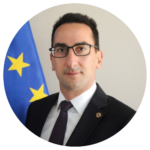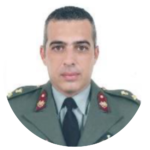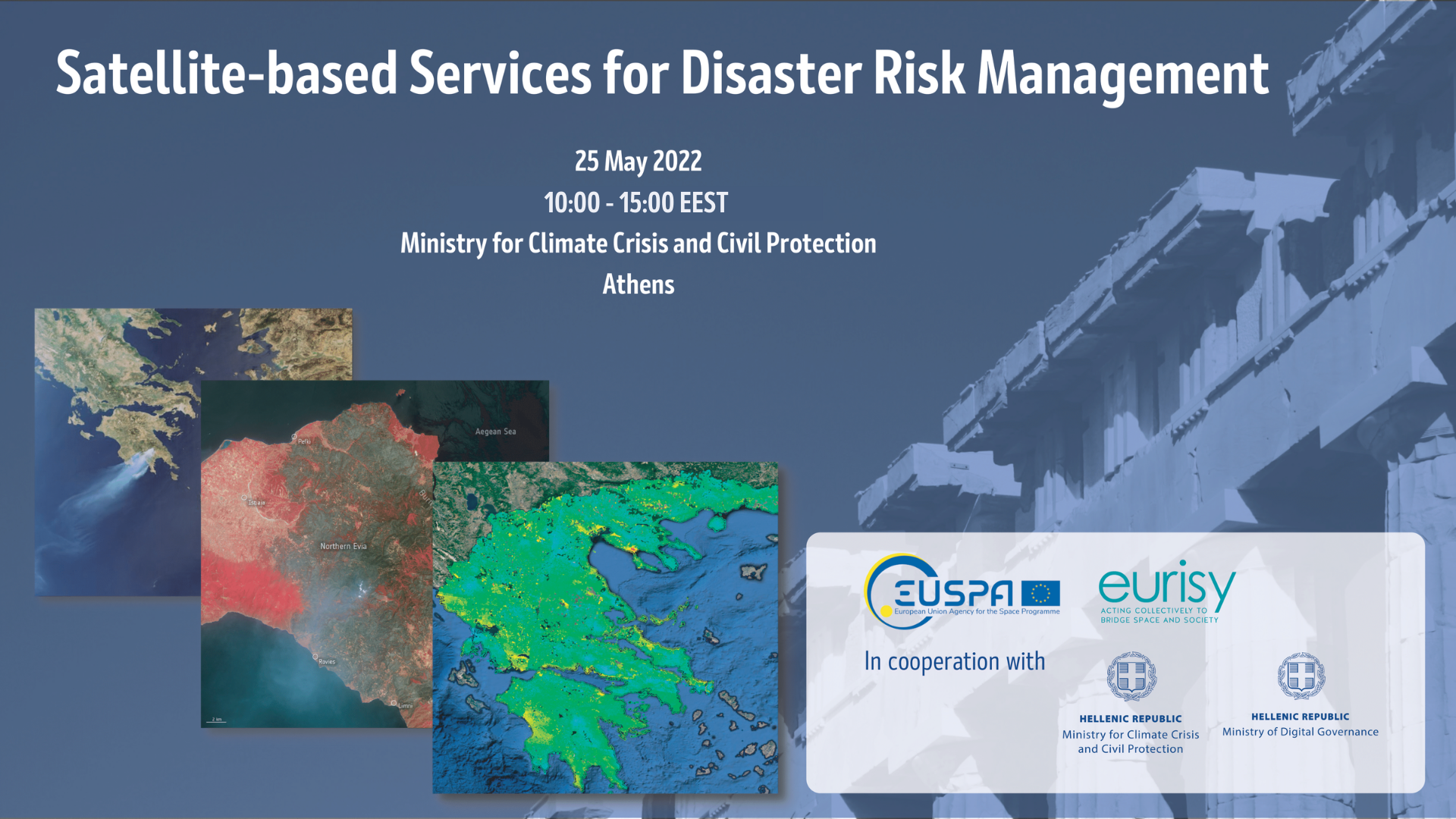Introduction and opening remarks
Christos Stylianides – Minister for Climate Crisis and Civil Protection

Christos Stylianides has been the Minister of Climate Crisis and Civil Protection of the Hellenic Republic since September 10, 2021. From 2014 to 2019 he served as European Commissioner for Humanitarian Aid and Crisis Management. During the same period he was EU Ebola Coordinator after his appointment by the European Council. From these positions he undertook important initiatives to address the effects of climate change. He is considered the “architect” of rescEU, the bold initiative that upgraded significantly the European civil protection system. In May 2021, he was appointed EU Special Envoy for Freedom or Religion or Belief (FoRB). In recognition of his work, Christos Stylianides received important honorary awards from governments and international organizations and institutions.
Kyriakos Pierrakakis – Minister of Digital Governance

Kyriakos Pierrakakis is the Minister of Digital Governance in the Cabinet of Kyriakos Mitsotakis. In 2007 he earned a Master in Public Policy from John F. Kennedy School of Government, Harvard University and in 2009 he earned a Master of Science in Technology and Policy from MIT. He also holds a bachelor’s degree in computer science from Athens University of Economics and Business. He served as Director of Research at Dianeosis, an independent non-profit think tank. He produced an array of research papers with a strong focus on economic growth and understanding the prevailing perceptions and beliefs among Greeks. He has also worked on technology policy for various research institutes in Greece and abroad and headed Youth Foundation as president.
Athanasios Staveris-Polykalas – Secretary General of Telecommunications and Post, Ministry of Digital Governance of Greece

Dr. Athanasios Staveris-Polykalas, completed his Bachelor Degree in Physics from University Of Athens and Masters in Applied Physics and Mathematics from NTUA. He completed his PhD in High Energy Physics. He worked as a researcher in the international experiment of CDF at Fermilab USA, under European Scholarship (RTN) and in co-operation with Instituto Nazionale di Fisica Nucleare Sezione di Pisa. He specialises in data analysis, use of AI and ML algorithms and Natural Language Processing. From July 2019 since November 2020 he worked as Technology Advisor to the Minister of Digital Governance Hellenic Republic. Since November 2020, he holds the position of Secretary General of Telecoms and Posts, under the Ministry of Digital Governance – Hellenic Republic. He is responsible for Space strategy implementation of Greece, Cyber Security, use of new technologies in telecommunications (AI/IoT) and the design of sustainable and resilient telecommunication infrastructures aligned with the Secure Connectivity initiative.
George M. Karagiannis - Deputy Secretary General for Civil Protection

Dr. George M. Karagiannis earned his Doctorate in Environmental Science and Engineering from Saint-Etienne School of Mines, France. In his dissertation, he developed a methodology for the assessment of emergency operations plans. He also holds degrees in Civil Engineering, Disaster Management and Business Administration. From 2016 to 2019, he was Technical Officer at the European Commission Joint Research Center, where his area of expertise revolved around emergency management, critical infrastructure protection and hybrid threats. Prior to joining the Joint Research Center, he was Disaster Management Consultant both in Greece and abroad. Among others, he was the Lead Expert on the development of Malta’s National Risk Assessment. He also was a Research Scientist at the Technical University of Crete, Greece. As Visiting Professor, he has taught emergency management and disaster resilience in France, and has publications in peer-reviewed journals and edited volumes. He is a Certified Emergency Manager by the International Association of Emergency Managers.
Rodrigo da Costa – Executive Director of the European Union Agency for the Space Programme (EUSPA)

On 16 October 2020, Rodrigo da Costa took up his duties as Executive Director of the European Union Agency for the Space Programme (EUSPA), formerly the European GNSS Agency (GSA). Prior to this, he was the Galileo Services Programme Manager from March 2017. Before joining the GSA, Rodrigo da Costa held several senior project management, business development, and institutional key account management positions in the space industry, in the areas of human space flight, exploration, launchers and R&D. Rodrigo da Costa holds a degree in Aerospace Engineering from the “Instituto Superior Tecnico” in Lisbon, a Master’s degree in Aerospace Engineering from the University of Delft, and an MBA from the EuroMBA consortium of Business Schools.
Keynotes speakers
Alexis Gizikis – project manager at the European Emergency Number Association (EENA)

Alexis Gizikis is a project manager at the European Emergency Number Association (EENA), since he joined the team in 2014. He is responsible for planning and coordinating the participation of EENA in collaborative projects with multiple stakeholders from academia, research, the civil society, the public and the private sectors. Alexis has been involved in projects about making the emergency location available to the PSAPs, the use of social media during emergency management, eCall, piloting new technologies in PSAPs, making health and medical data available to emergency services, and lately, studying solutions and practices that help the interaction between the public and the authorities, during disaster management. In the past, Alexis has been working in the ICT sector since 1999 and has been involved in management, R&D and consulting activities. He is a Greek national, and he holds a Master of Engineering (MEng) from the University of Aberdeen, in Scotland.
Thomas Kalamaris – Technical Director Hellas Sat

Thomas Kalamaris holds a degree of Electrical and Computer Engineering School (ECE) of the National Technical University of Athens, and a PhD in Communication, Electronic and Information Engineering of the National Technical University of Athens. In his capacity as a Technical Director he oversees all the technical elements for the efficient satellite operations, the establishment of an interference free environment and the smooth deployment of Hellas Sat’s new programs.
Charalampos (Haris) Kontoes – Research Director National Observatory of Athens (NOA), Institute for Astronomy and Astrophysics Space Applications and Remote Sensing (IAASARS)

Dr. Haris Kontoes received his Doctorate in Remote Sensing of the Environment (NTUA, 1992) holding a grant from the European Commission in the Institute for Space Applications of the Joint Research Centre at ISPRA (Environmental Mapping Group, JRC). Since 1992 he has been assuming responsibilities in managing Earth Observation operational & research projects, focusing on risk assessment and mitigation, disaster risk reduction, environmental resource management and sustainable development, agriculture and food security, energy and big data analytics for cross sector needs. In his capacity as National Delegate he participates in Space Policy Boards and Program Committees (e.g. ESA PBEO, EC Space Program Committees (FP7, H2020), COPERNICUS Committee, Space Advisory Committee).
Luisa Bettili – Senior Expert at the Copernicus Emergency Management Service

Since 2020, she is the Technical Manager of the Copernicus EMS Risk and Recovery Mapping at service provider e-GEOS. She is an expert in hydraulic modelling for flood disaster risk mapping, based on the integration of satellite imagery. She holds a PhD in Civil/Hydraulic Engineering, Water Resources Management in Developing Contexts, and a MSc in Civil/Environmental Engineering for Natural Risks Protection, both from the University of Roma Tre.
Stelios Bollanos – Co-founder & Director of Planetek Hellas

Stelios Bollanos started in Planetek, a European Downstream Space Value Adding SME group of companies, in 2004, as a young graduate trainee. In 2005 returned from Italy to Greece and co-founded Planetek Hellas. He is now the director of Planetek Hellas, a Greek space SME employing 25 highly qualified men and women. In his 17 years of experience, managed various accounts for costumers such as the European Space Agency (ESA), the EU Commission, the European Union Satellite Centre (EU SatCen), the European Environment Agency (EEA), the Joint Research Centre (JRC) and other important costumers at National and International level. He has matured experience in the business sector related to the technology domains of Satellite Earth Observation, Spatial Data Infrastructure, Space Astronomy Data Management, On Board and Ground Segment Space Software. He has very good knowledge of the European and Greek Space Market.
First panel
Ioannis Papoutsis – Researcher at the Institute of Astronomy, Astrophysics, Space Applications and Remote Sensing of the National Observatory of Athens

Dr Ioannis Papoutsis holds a diploma in Electrical and Computer Engineering from the National Technical University of Athens, a Master of Science in Telecommunications from University College London, an MBA from Alba Business School, and a PhD in satellite remote sensing from the National Technical University of Athens. He is currently leading OrionLab, the research group that focuses on big satellite data analytics and machine learning for Earth Observation applications, with emphasis on natural disasters management, monitoring and forecasting. He has participated in several European-funded projects. Dr Papoutsis is currently the coordinator of DeepCube, an Horizon 2020 project that develops Artificial Intelligence pipelines for big Copernicus data to study climate change impacts, and SeasFire, a European Space Agency project on seasonal wildfire prediction with advanced deep learning.
George Eftychidis – Head RTD Satways

George Eftychidis has a forestry and Environmental Management background from the Aristotelian University of Thessaloniki (Gr). His R&D interests include modeling and simulating natural hazards and assessing related risks, using modern solutions and innovative approaches, including GIS, video surveillance, Earth Observation, AI, UAS, and ICT capabilities. He contributed to developing forest fuel maps at local, regional, and national levels and participated in relative efforts at the EU scale. Such tools are currently used operationally by public services in EU countries. In addition, GE worked in public and private contracts on security, environmental management, critical infrastructure protection, and civil protection in the private sector. Since 1991 he has coordinated and managed national and European R&D projects and cooperated with numerous public organizations in the EU while cooperating with EC services as a reviewer and expert in policy making missions. Currently, he is Heading the R&D department of Satways Ltd.
Nikolaos Bartsotas – Post-Doc Researcher in Atmospheric Physics and Numerical Weather Prediction in the National Observatory of Athens

Dr. Nikolaos Bartsotas is a Post-Doc Researcher in Atmospheric Physics and Numerical Weather Prediction in the National Observatory of Athens (Beyond Center of Earth Observational Research and Remote Sensing) and the National Academy of Athens. His research interests include the study of flash-flood inducing heavy precipitation events over complex terrain areas as well as the effective fusion of NWP with available EO datasets and ground observations towards a more accurate monitoring of precipitation. He has been actively involved in numerous FP6/FP7/H2020 research programs as well as the implementation of operational forecasting platforms and staff training in agencies such as Qatar Meteorology Department (QMD) and Saudi Aramco. In the e-shape project he is the pilot leader of ResAGRI, a newly developed platform that provides precision agriculture services both to the agro-insurance companies as well as a broad spectrum of end users in the Agricultural sector.
Vangelis Karkaletsis – Director of the Institute of Informatics & Telecommunications (IIΤ) at NCSR Demokritos

Dr. Vangelis Karkaletsis is the Director of the Institute of Informatics & Telecommunications (IIΤ) at NCSR Demokritos, Member of the National Council for Research and Innovation (ESETEK) and Member of the National Bioethics & Technoethics Commission and coordinator of H2020 research project AI4Copernicus. His research interests are in the areas of content analysis, big data management, knowledge representation, human-machine interaction. Head of the Software & Knowledge Engineering Lab (SKEL The AI Lab) at IIT, from 2004 to 2019. Coordinator, scientific and technical manager of many European and national projects and organiser of numerous international conferences, workshops and summer schools. While he was responsible for the Institute’s educational activities, for more than 10 years, he initiated the joint PhD scholarship programme with several Universities abroad, launched the new MSc in Data Science and MSc in Artificial Intelligence programmes for NCSR Demokritos, and set up the new educational programme for primary and secondary schools.
Second panel
Andreas Antonakos – Hydrogeologist MSc. PhD, Civil Protection Greece

Dr. Andreas Antonakos holds a PhD (2012) in “GIS applications for Environmental Hydrogeology” and an MSc (1998) in “Applied Environmental Geology”, both from Patras University, while his bachelor’s degree is in geology (1995). He has more than 10 years (1997-2009) working experience as a consultant in the fields of hydrogeology and GIS applications in earth sciences. He has conducted or participated, in more than 20 projects in the field of hydrogeology and GIS applications and has more than 30 peer reviewed scientific articles, in international scientific magazines and conferences. Currently he is the head of the Natural Disasters department of the General Secretariat for Civil Protection, in which he is working over the past 13 years (2009-2022). Since 2012, he represents the national focal point of the Copernicus Emergency Management Service – Mapping (CEMS) for Greece.
Zisoula Ntasiou – Fire Lieutenant Colonel in the Hellenic Fire Corps

Zisoula Ntasiou is a Fire Lieutenant Colonel in the Hellenic Fire Corps, part of the General Secretariat for Civil Protection and the Ministry for Climate Crisis and Civil Protection. She graduated from the Hellenic Fire Academy in 2002, in addition she holds a degree and a master degree in Forestry (School of Forestry and Natural Environment, Aristotle University of Thessaloniki). The last 18 years Zisoula Ntasiou is working as a Duty Officer in the National Coordination Center for Operations and Crisis Management of the Hellenic Fire Corps in Athens and during the summer in the Aerial Fire Fighting Coordination Center. In 2017, Zisoula Ntasiou was a member of the Forest Fires prone countries experts group in the Emergency Response Coordination Centre (ERCC) in Brussels. She is also a member of the Forest Fires commission of the International Association of Fire and Rescue Services (CTIF).
Yannis Ioannidis – Professor at the Department of Informatics and Telecommunications of the National and Kapodistrian University of Athensas

Yannis Ioannidis is a Professor at the Department of Informatics and Telecommunications of the National and Kapodistrian University of Athensas well as an Associated Faculty at the “Athena” Research and Innovation Center, where he also served as the President and General Director for 10 years (2011-2021). He is the software director of the EuropeanHuman Brain Project flagship initiative,the coordinator of the EOSC Futurestrategic project, which implements the core elements of the European Open Science Cloud, and a coordinator or partner in tens of other European and national research and innovation projects. He is an ACM and IEEE Fellow, a member of Academia Europaea, and a recipient of the ACM SIGMOD Contributions Award and several other research and teaching awards. He has served as the Secretary / Treasurer of the Association of Computing Machinery (ACM), has been a member of the ACM Europe Council, and serves as the Faculty Sponsor of the Univ. of Athens ACM Student Chapter. He is also the Greek delegate to the European Strategy Forum on Research Infrastructures (ESFRI), a member of its Executive Board, and the ESFRI representative to the e-Infrastructures Reflection Group (e-IRG). Finally, he is on the strategic management board of the Greek hub of the UN Sustainable Development Solutions Network.
Panagiotis Fragkosis – Major of the Hellenic Army Geographical Corps

PanagiotisFragkosis an Army Officer and Geospatial Engineer, holding the rank of Major, in the Hellenic Army Geographical Corps. He is currently serving as the Director of Military Applications Sub-Directorate in the Hellenic Military Geographical Service (HMGS), previous positioned as Head of Border Department, Head of Geodesy Department and Assistant in Photogrammetry and Remote Sensing Sub-Directorate. He graduated from the Hellenic Army Academy in 2004 and the Army School of Topography in 2006. In 2013 he received a Diploma in Rural and Surveying Engineering and in 2016 an MSc title in Geoinformatics, from National Technical University of Athens (NTUA), with emphasis in modern Earth Observation technologies and their applications. Hehas spearheaded numerous projects, includingcampaigns for geospatial data field collection, establishing workflows for utilization of satellite imageryand Geospatial Intelligence integration. He teaches Remote Sensing and Geospatial Intelligence in several courses of the Hellenic Joint Intelligence School.
Christos Kontopoulos – CTO, Geosystems Hellas

Christos Kontopoulos received his diploma from National and Technical University of Athens (NTUA) – School of Rural & Surveying Engineering. His main research interests and areas of specialization lie in the fields of Εarth Observation and remote sensing, GIS, photogrammetry and geospatial data analysis. He has been enrolled in several research projects and research teams, in the aforementioned domains while also presenting a great experience on photogrammetric, LIDAR data analyzing, cadastre and satellite data exploitation projects. His main expertise also includes the development of Machine Learning and Deep Learning models for EO data classification and pattern recognition techniques. He has also been involved in several other commercial projects, as a remote sensing and photogrammetry specialist, dealing with the processing and the analysis of multispectral / hyperspectral / UAV optical data, SAR, as well as LIDAR data.

